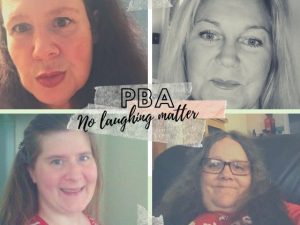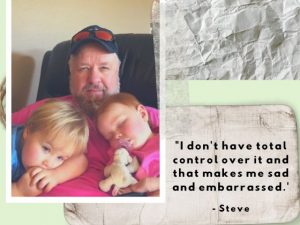“I have fits of uncontrollable laughter and it’s not fun or funny.”
That’s how Jennifer explains life with pseudobulbar affect (PBA). Wendy has the same condition and describes her experiences:
“It’s frustrating because you have no control over [laughing or crying]. They occur at the most inopportune moments. You will be laughing one minute and crying the next. Sometimes you can just be walking through the room and it will take place.”
Pseudobulbar affect has many other names like emotional incontinence, pathological crying and laughing, emotional lability or involuntary emotional expression disorder.



But what is PBA? What causes it?
The most telling sign of a PBA episode is exaggerated, involuntary crying and/or laughing that doesn’t match your feelings. A person with PBA may have a normal mood until an episode occurs.
Some say episodes come on so quickly it feels like a seizure.
“It is almost like seizures (I have seizures too) and I am a bit unconscious of the feeling – the laughter just comes out of my body.” – Vicki
PBA is a neurological disorder caused by damage to the nervous system and people with the following conditions are most commonly affected: traumatic brain injury, stroke, multiple sclerosis, Parkinson’s disease, Alzheimer’s and dementia.
While Jennifer, Wendy and Vicki describe their PBA matter-of-factly, it’s sometimes hard for people to talk openly about it. PBA can often go undiagnosed or be mistaken for a mental health disorder.
We decided to call on individuals within our community and on social media to share what life with PBA feels like for them. Here’s what you should know:



“One time we moved our daughter into her dorm room and decided to have lunch at a restaurant that we like to frequent. We got to the restaurant and I just started sobbing, which quickly turned into bawling, all while we were being seated by the hostess. Everyone was staring at us as if maybe someone should call the police. It was humiliating.” – Eric
“I had a massive stroke in 2013 at age 29. I was given a 2% chance of surviving. I have been working very hard to get back to the way I was. I used to be outgoing and I was very active. Now PBA has me avoiding so many things I want to do so I don’t react wrong. Weddings and funerals are so, so, hard for me. I cry uncontrollably. It’s embarrassing.” – Amy
2) Episodes can be confusing or scary.
“Having an episode of uncontrollable ugly crying while you are driving is very disruptive, even dangerous.” – Jackolyn
“The laughing isn’t actually funny. I laugh so hard that I can’t breathe, it’s scary.”
“One drive was tricky…I had never experienced this strange mix of disconnected emotions, never even heard of such a thing but there I was, flying down the highway, laughing like a maniac, then sobbing gently, nose running, no tissues… It was as though an invisible passenger was practicing her emotional range for a soap opera audition.” – Lynda



3) Personal relationships are sometimes affected.
“I had an ‘episode’ the other day and my honey thought I was making fun of him for something but I was laughing so hard I couldn’t tell him that I was laughing at literally nothing. For ten minutes he was upset thinking I was laughing at him. It was horrible. I felt so bad!” – Nikki
“PBA nearly ended my marriage.” – Anon
4) PBA can have a devastating impact on your career or housing situation.
“I’m a nurse in surgery. [Once] I burst out laughing and the doctor kicked me out of the operating room.” – Anon
“[I am] a medically retired law enforcement officer. It really sucks when you’re trying to arrest someone or deal with an inmate and you are constantly crying. They think you’re a real basket case.” – Billie
“I was reviewing a supervisor when suddenly I started crying…I didn’t feel sad…The guy was an absolute jerk, and I had to excuse myself, saying I was tired and supposed to be on my way to a neurologist appointment” – Lynda
“It’s very hard for people with the condition to keep apartments or places to live because the episodes can happen at any time and they are loud.” – Joshua



“Sometimes it’s so difficult because I never know what is going to happen next. Will I be able to see today or will I be able to stand or walk or will I spend today laughing or crying even when I don’t want to?” – Tracy

